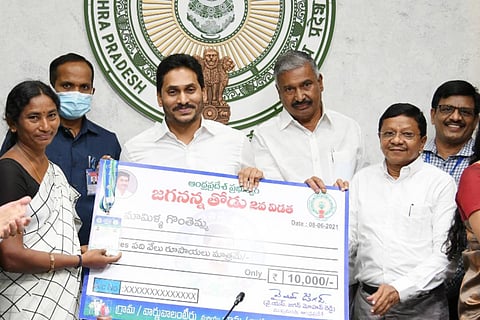

On June 8, the second instalment of the Jagananna Thodu scheme was announced by the Andhra Pradesh government, with around 3.7 lakh small traders and artisans granted an interest-free loan of Rs 10,000 each. The scheme is meant for self-employed traders, including street vendors, small shop owners and artisans, who often find it difficult to secure small loans from banks and are forced to borrow from moneylenders at exorbitant interest rates towards their working capital. While around 9.05 lakh small traders were identified as eligible beneficiaries last year, only 5.35 lakh beneficiaries received the loan amount of Rs 535 crore by the banks in the first phase.
In the second phase launched on June 8, the remaining 3.7 lakh beneficiaries received the loan amount of Rs 370 crore. The government will bear the interest on these loans, and deposit the interest amount directly into the accounts of beneficiaries, who can then pay the banks. The loan amount itself is expected to be repaid by the beneficiaries within a year, through EMIs. No collateral is required.
Jagananna Thodu is an extended version of the PM SVANidhi scheme (PM Street Vendors AtmaNirbhar Nidhi), which provides a similar working capital loan of up to Rs 10,000 to street vendors. Prior to its launch, state BJP leaders had even claimed that the YSRCP government was merely renaming a Union government scheme, and demanded that the scheme be publicised with images of Prime Minister Narendra Modi.
While Jagananna Thodu does avail the support of the PM SVANidhi scheme, it has been extended beyond street vendors to also include small shop owners as well as people engaged in traditional handicrafts like lace work, kalamkari, Etikoppaka toys, Kondapalli toys, leather puppets, potters, Bobbili Veena, brass craft articles, etc. To avail the scheme, beneficiaries must have a monthly income of less than Rs 10,000 (rural) or Rs 12,000 (urban), cannot have a shop larger than 5x5 sqft, and their family’s landholding should be under 3 acres of irrigated land, or 10 acres of irrigated/unirrigated land.
Applications from small traders and artisans are first processed by ward and village volunteers, who verify their eligibility. The District Collectors then forward their applications to banks for further processing, who are required to disburse the loans through direct transfer to the beneficiaries’ accounts. No physical inspection of the applicants’ units by bankers is needed for the loan sanction, according to the scheme’s operational guidelines. In the first phase, the scheme saw a few hiccups as processing of the loans was delayed by banks.
While the first phase was launched on November 25, 2020, a month later several beneficiaries in Krishna district staged protests against delay of loan sanctions, by dumping garbage in front of banks. At the time, Vuyyuru Municipality Commissioner N Prakash Rao, who was later suspended for endorsing the protest, said that several banks had not been cooperating with the processing of loans under welfare schemes including Jagananna Thodu. He alleged that although beneficiaries were leaving their work and making daily visits to the bank, the bank managers were talking to them in a belittling manner.
In the second phase announced on June 8, the remaining 3.7 lakh beneficiaries are being extended loans through the state government’s Sthreenidhi Credit Cooperative Federation and APCOB (Andhra Pradesh State Cooperative Bank), Chief Minister Jagan said.
Once the beneficiaries make the loan repayments in time, the state government will reimburse the interest amount to the beneficiaries’ accounts. Under the PM SVANidhi scheme, beneficiaries are reimbursed at 7% interest rate, and any remaining interest amount will be borne by the Andhra Pradesh government under Jagananna Thodu.
So far, the state government has paid Rs 29.42 crore towards interest for the 5.35 lakh beneficiaries in the first phase. For the 3.7 lakh beneficiaries in the second phase, the government will have to pay another Rs 20.35 crore in interest. On timely repayment of the loan along with interest, the beneficiaries will be eligible for another cycle of the loan under the same scheme. Eligible persons can still apply for the scheme through ward and village volunteers, and will receive the loan amount within six months, government officials said.
Read: